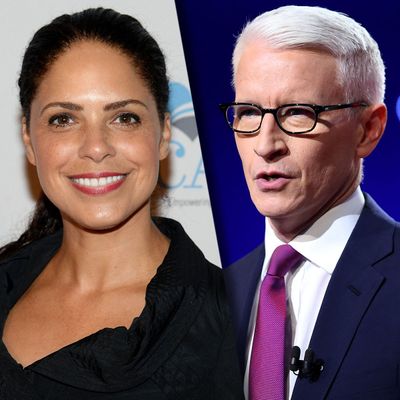
Batman v Superman is not a movie that inspires strong feelings; it’s a ponderous, incoherent film that mostly summons up a dull distaste. And yet, one aspect of it filled me with a profound civic disgust, like witnessing a congressman steal from a child: Throughout the film, journalists, including Anderson Cooper and Soledad O’Brien, showed up to comment on the onscreen action. This is wrong. This should not be. Journalists should not play themselves in superhero films.
The issue is not one of taste. Batman v Superman is a terrible film, make no mistake, but these journalists’ cameos would be equally reprehensible had they taken place in a fine film, or a good film, or even a great film. As it happens, Batman v Superman’s utter ineptitude only highlights the cravenness on display: These reporters, who hold themselves as stewards of the public trust, sold themselves out for a movie that turned out to be the comic-book equivalent of The Room. DJ Khaled has a word for that.
That’s right — sold themselves out. As much as the dignity of the profession is repeatedly and outrageously violated every day (if not every hour), journalism, at least in theory, remains an institution with a moral commitment to the public: To report the news, fairly and honestly; to expose injustice; to offer readers insights into a world they may not know. Is it naïve to think that, by signing on to read fake news reports about rampaging aliens threatening a fictional city, these reporters have subsumed those noble goals in order to promote their own personal brands?
It’s worth noting, of course, that Cooper’s role in Batman v Superman may not have been entirely up to him: Warner Bros., the film’s studio, shares a parent company with CNN, his employer*. In a film that has cross-promotion baked into its creative DNA, it’s possible his cameos were part of a mandatory corporate branding initiative. But, if anything, this possibility is even worse. If journalists so easily bend to the will of their bosses when it comes to appearing in a Zack Snyder movie, how can we expect them to fight when reporting on issues where the interests of the public conflict with the corporation’s bottom line?
Cooper and O’Brien aren’t alone — plenty of other media figures, from Nancy Grace to Neil deGrasse Tyson, have cameos in the film. Where do you draw the line? We’ll admit it’s fuzzy: Though Tyson moonlights as a film critic, he doesn’t have the same responsibilities to the public as a reporter. Likewise with some of the others. Andrew Sullivan is retired and can do whatever he wants, while Nancy Grace is basically playing the fictional character “Nancy Grace” on television anyway. Their appearances in Batman v Superman embarrass only themselves.
How should superhero movies handle the media, then? Why not follow the example of The Dark Knight and make journalists actual characters in your film? Casting actors as fictional journalists not only makes for a better performance, it also results in more interesting stories: Freed from responsibility to any real-life networks, Anthony Michael Hall’s sleazy news anchor could be a fully fledged actor in that film’s drama.
In recent decades, it’s become commonplace to ask journalists to constrain their personal behavior in deference to their role as objective arbiters of truth. We’re comfortable asking reporters not to endorse candidates, express political opinions, or even cheer in a press box. I’m not going that far. All I’m asking is for journalists not to appear in superhero films, for the good of the republic. That’s not too much to ask for, is it?
*This post originally stated that CNN was O’Brien’s employer. She left the cable network in 2013 to launch her own production company, which produces content for CNN and HBO.





